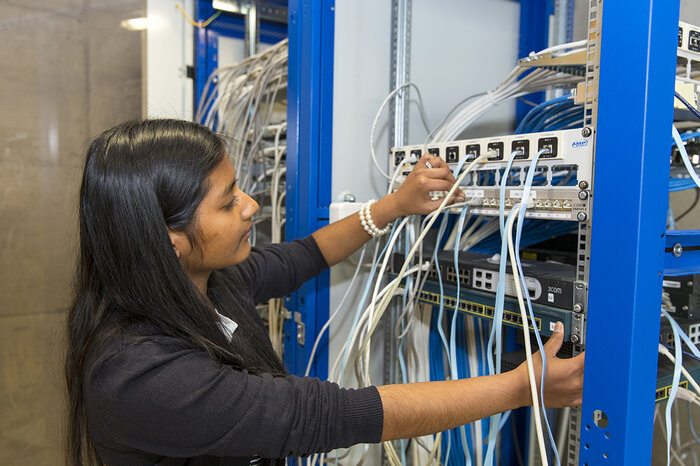The IT laboratories of Computer Science degree programmes
The technical laboratories are equipped to the highest standards and are open to students and, in some cases, engineers from industry. Various software installations and virtual database servers as well as workstations and laptop workstations provide you with an ideal learning environment. As a student, you have free access to technical laboratories - seven days a week for 24 hours!

Network Laboratory
The network laboratory offers you an experimental environment with different operating systems, routers, switches and a high flexibility in the area of couplings, where you can gain experience with these modern technologies. This will prepare you well for real-life situations in Business and Management. Open source software and insights into their development processes will enhance your understanding of modern software and software development processes. In the context of e.g. bachelor's theses, you can also create contributions for the communities yourself.
Database Laboratory
Data and its processing play a central role in many areas of modern business life. The modeling, organization, keeping and security, etc. of data are essential core issues. Increasingly, the holding and processing of data is being virtualized and outsourced to the cloud. Various virtual servers and cloud providers are available at the FHV.
Software Engineering Laboratory
The software engineering laboratory is specially designed for the requirements of software engineering with work islands with a central screen and laptop workstations. Sufficient flipcharts and pinboards can be used by you, especially for agile software development processes.
Various software installations and virtual database servers as well as workstations and laptop workstations provide you with an ideal working environment.
Embedded Systems Laboratory
The Embedded Systems Laboratory is about intelligent networking in heterogeneous system landscapes. The core pieces here are various test boards of current microprocessors (Beagle Board, AVR, ARM, etc.) and mobile devices (primarily smartphones and tablets), which are connected to sensors, input devices and actuators via a wide variety of interfaces (WLAN, Bluethooth, ZigBee, DMX, etc.). The focus in the projects is primarily on how modern methods of software engineering can be used for successful developments in the hardware-related area.
Virtual Reality Laboratory
The Virtual Reality (VR) laboratory is equipped with hardware and software for creating and viewing or "walking" virtual scenes. Various state-of-the-art devices and tools are available for this purpose, for example, very different input devices (Microsoft Kinect, Myo wristband, haptic devices, Leap Motion, eye trackers, a magnetic as well as an optical motion capture system, etc.). For output, various (auto-)stereoscopic displays, head-mounted displays (from Oculus Rift) and 3D printers are available. The developments are based on game and VR engines (including Unity) and 3D computer animation systems (including Autodesk Maya).




